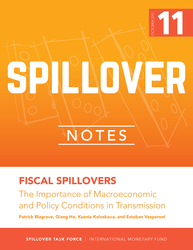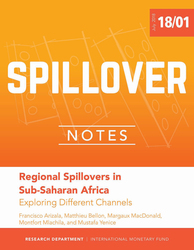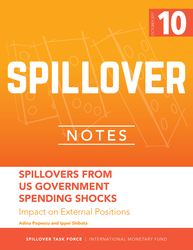
Fiscal Spillovers
The Importance of Macroeconomic and Policy Conditions in Transmission
Are fiscal spillovers today as large as they were during the global financial crisis? How do they depend on economic and policy conditions? This note informs the debate on the cross-border impact of fiscal policy on economic activity, shedding light on the magnitude and the factors affecting transmission, such as the fiscal instruments used, cyclical positions, monetary policy conditions, and exchange rate regimes. The note assesses spillovers from five major advanced economies (France, Germany, Japan, United Kingdom, United States) on 55 advanced and emerging market economies that represent 85 percent of global output, looking at government-spending and tax revenue shocks during expansion and consolidation episodes. It finds that fiscal spillovers are economically significant in the presence of slack and/or accommodative monetary policy—and considerably smaller otherwise, which suggests that spillovers are large when domestic multipliers are also large. It also finds that spillovers from government-spending shocks are larger and more persistent than those from tax shocks and that transmission may be stronger among countries with fixed exchange rates. The evidence suggests that although spillovers from fiscal policies in the current environment may not be as large as they were during the crisis, they may still be important under certain economic circumstances.
Publication date: October 2017
ISBN: 9781484320303
$4.99
Add to Cart by clicking price of the language and format you'd like to purchase
Available Languages and Formats
| English |
Prices in red indicate formats that are not yet available but are forthcoming.
Topics covered in this book
This title contains information about the following subjects.
Click on a subject if you would like to see other titles with the same subjects.
Spillovers , fiscal policy , transmission , economic impact , cross-border impact
Summary
Copyright © 2010 - 2024
Powered by:
AIDC



